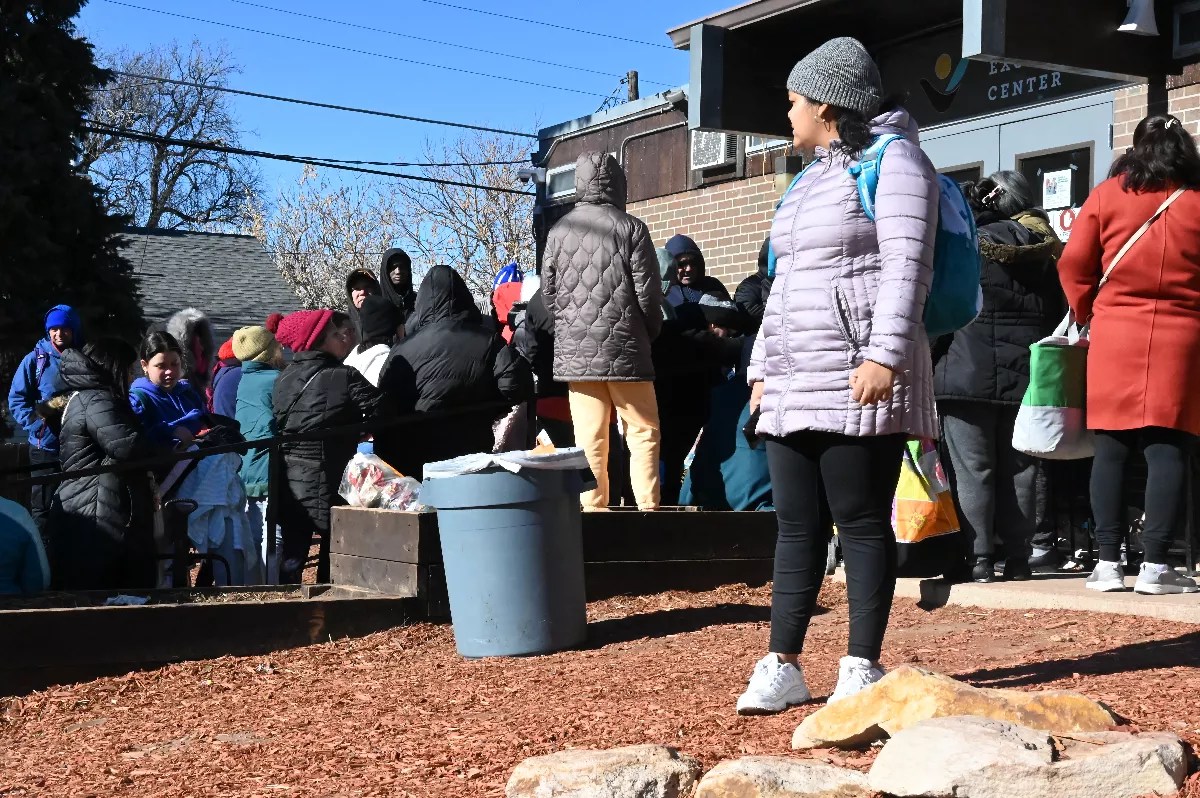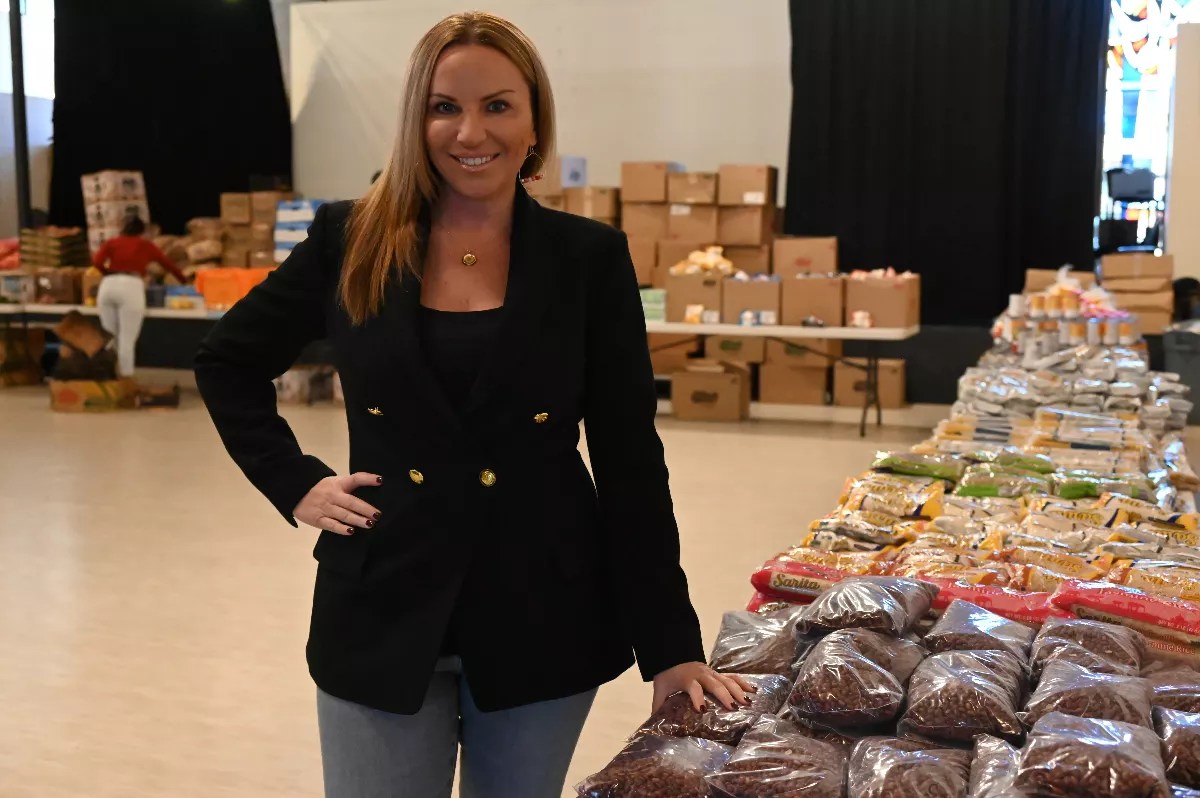
Bennito L. Kelty

Audio By Carbonatix
Every week, more and more families from Venezuela have been lining up outside of the Village Exchange Center at 1609 Havana Street in Aurora. The nonprofit offers free COVID and flu vaccines on Tuesdays, gives away free food and clothes on Wednesdays, and offers a distribution program on Thursdays.
“Right now, I’m here to see if they give us information on the help with housing around here,” says Jorge Luis Baez, a Venezuelan migrant who’s living in an apartment with a cousin and joined the line on January 10. “We’re also trying to get information about food.”
The Village Exchange Center offers free rice, beans, oatmeal, noodles, juice, milk, eggs and cooking oil through its food pantry program. The nonprofit has been serving 3,000 people a week for the past three or four months, and that includes around 600 to 800 families that are mostly migrants; every week, it gives away more than 18,000 pounds of food worth upwards of $22,000, according to the nonprofit.
The center’s services are particularly valuable for the migrants who have been flooding into the metro area because many VEC volunteers are Spanish speakers or immigrants and refugees themselves.
The nonprofit was started by Marcel Naruki, a former Lutheran pastor, and Amanda Blaurock, a lawyer and Naruki’s stepdaughter, in 2017, specifically to meet the needs of north Aurora’s diverse community. But that community has changed with the influx of migrants; before last year, the center used to help about 200 families each week.
“The neighborhood is largely refugees and immigrants, so the logical thing was to open our doors and figure out how we can respond to the neighborhood,” Naruki says. “The big uptick in activity and service is a result of the Venezuelan, Colombian newcomers. Our pantry has been exploding. The vaccine program has been exploding precisely with the new arrivals, and we continue to serve the neighborhood that’s been here.”
As a result of the explosion of need, the nonprofit is now struggling to find help for itself, and “we don’t want to turn people away, but we don’t currently have extensive funding to support the new arrivals,” Blaurock adds.
“Right now, there’s very limited resources to manage and provide programs to new arrivals that are asylum seekers,” she says. “It puts us in an awkward situation, because regardless of whether there’s funding for it, we have people showing up at our doors in the hundreds, if not thousands, three days a week.”
More than 37,000 migrants have come to Denver since late 2022, and Blaurock says that influx is having a clear impact on surrounding cities, including Aurora.

Amanda Blaurock, executive director of the Village Exchange Center, is demanding more federal support.
Bennito L. Kelty
“This started out as a Denver issue because people were bused into Denver,” she says. “Ultimately, people will start moving outside of Denver because they realize it’s very expensive in Denver and the services that they’re given are terminated. When you stay at a shelter, you have to leave within fourteen days, so now where are you going?”
Often to Aurora, because the city has a reputation of being “very friendly to immigrants and refugees and also has nonprofits and programs that support refugees,” she explains. “People don’t know county lines or city lines…we’re in a position where we’re right on that border, and we’re providing services and open to people with mixed status.”
While Denver has been working on its programs for migrants, “Aurora is not, as a city, taking on any migrants,” Blaurock adds. “They have no shelter programs. They have no programs that offer any assistance.”
“As a city, not a county, Aurora is not structured or funded to provide health and human services to the community,” responds Michael Brannen, a spokesperson for the city. “Those services are provided by each of the counties in which Aurora is located. Without any city-owned shelter space or related infrastructure for migrants in Aurora, we are currently limited in our ability to house individuals.”
Right now, Aurora is funding migrant shelters at Comitis, at 2178 Victor Street, with a $483,000 contract and at the Aurora Day Resource Center, at 13387 East 19th Place, with a $200,000 contract.
Regarding Arapahoe County’s position, Public Information Officer Anders Nelson offers this statement: “The Arapahoe County Board of Commissioners share concerns about the influx of migrants, especially with the approaching cold weather. Commissioners are working with county and state leaders to identify possible solutions to this crisis, including regional approaches. Funding remains the biggest hurdle for these efforts, as Federal and state funds are constrained by statute and prevent the county from serving undocumented migrants.The County continues to look at the best ways to help with the influx of migrants into the area. While options are being reviewed, we are referring any migrant needs to community partners who serve this population as well as any existing county services they may be eligible for.”
Officials with Adams and Douglas counties did not respond to requests for comment about their response to the migrant situation in Aurora.
Mateo Alvarez, who runs the Dayton Street Day Labor Center, located half a mile up the street from the Village Exchange Center, says an initial wave of migrants on October 22 “almost crushed us and other nonprofits because of the amount of need when it came to housing, access to food and work.” While he says he understands that “the City of Aurora doesn’t have the infrastructure to offer the services in Denver,” he was disappointed that Adams and Arapahoe counties, which cover north Aurora, never stepped in to help.
“There hasn’t been any definitive ‘We want to help’ from either of the counties, and the counties haven’t really said why they don’t want to help with the migrant response in Aurora,” Alvarez adds. “We’re not getting any help from the city of Aurora or the counties. That’s what makes us different from Denver, where you have one city, one county, with the same boundaries.”
The lack of support led to the creation of the Aurora Migrant Response Network, a coalition of fifty Aurora nonprofits that Alvarez heads.
The nonprofits “are very far downstream” from the federal government as a funding source, notes Blaurock, who’d like to find a way for the Village Exchange Center and other providers to access federal emergency funding on their own.
On October 25, she wrote a letter to Colorado’s congressional delegation asking that lawmakers urge the Federal Emergency Management Agency to put more money into the Shelter and Services Program, a FEMA fund, and create a way for nonprofits to tap into it directly. The letter had the support of state legislators, Aurora Public Schools boardmembers and the Aurora Migrant Response Network.
“Aurora has seen a very large influx of migrants over the last several months, which is causing a huge strain on the City of Aurora and the non-profits on the front line serving and addressing the needs of these newcomers,” Blaurock wrote. “As we see the increase of migrants into Denver, we are simultaneously seeing those who stay for longer periods moving into Aurora.”
The Village Exchange Center has relied “very minimally” on Denver money to help with migrants, Blaurock says, and she doesn’t expect much more.
“Most of Denver County has their own nonprofits and programs that they service,” she says. “They also have spent $38 million on this issue, and have the majority of the 4,700 people who come there. They’re not in a position to give money to Aurora or to Carbondale or to anyone else to deal with an issue they’re struggling to deal with on their own.”